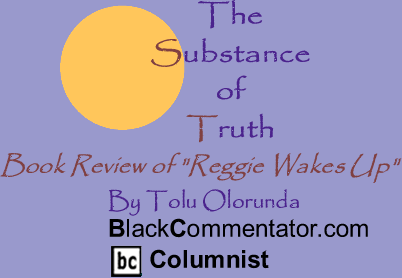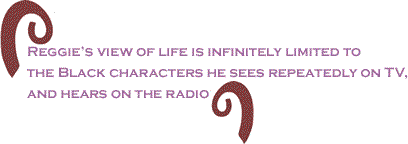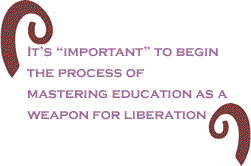
|
|||||||||||||||||||||||

|
|

Custom Search
|
|
 |
|
With
the recent victory of President-Elect Obama, many have speculated
a change of attitude in young black men, vis-à-vis the thirst
for educational prowess. Whilst this prediction does seem, by
all measures, accurately reflective of the lingering emotion within
Black circles, some have suggested the need for a handbook of
sorts, as necessary in guiding Black students, male and female,
toward a more promising future. Of such is Zekita Tucker, a Reggie Wakes Up is a blueprint for teachers and students alike – with an emphasis on public schools. In a moment when numerous questions abound, concerning the fulfillment of a Black presidency, Ms. Tucker has provided some suitable and reliable answers, in dealing with Black students. Meant for ages 8 and up, Reggie Wakes Up takes a hard look into the public school system, and its effects on the psyche of Black students. Though written in simplified terms, and intended for a young readership, Zekita Tucker takes into strong consideration the impact teachers have on their students. With subtle advice for tutors confused about their role(s) in the education relationship, Ms. Tucker has written and published a great resource for combating the sleeping giant of black academic inferiority in the public and private school systems. Reggie, the book’s main character, is presented as a representation of young black masculinity in society. With a clear overdose on commercial Hip-Hop and other forms of mindless entertainment, Reggie’s view of life is infinitely limited to the Black characters he sees repeatedly on TV, and hears on the radio. With a nickname of “Dolla,” Reggie’s outlook is blurred by the pursuit of temporary pleasure, and endless gains. As he strolls late into class, Reggie feels at home in a classroom filled by nonchalant and directionless students. Prompted by Ms. Roberts (his 6th grade teacher) to take off his hat, Reggie refuses as he furthermore declines the offer to pay close attention to her subsequent demands. In public schools across the country, marred by unenthusiastic, frustrated, ill-equipped and financially-challenged instructors, most similar scenarios unveil an all-too-familiar ending: The protagonist gets suspended, the rest of the class revolts, teacher takes leave of absence, less-enthused substitute teacher is hired, and the vicious cycle repeats itself – until each student has been suspended, or placed in detention, at least once. In this case, however, Ms. Roberts lays out a manuscript for future, and present, inner-city school teachers.
Those who have struggled for many years with the hoop/mic-dreams of younger Black males/females understand the dire need for, as Dr. King might put it, a revolution of values in the younger generation. The psychological warfare waged by big-media companies against the mental-fiber of Black children is bearing poisoned fruits, as more, and more, Black kids see no future worthy of aspiration, beyond the entertainment realm. For a disturbing number of Black younger adults, a deliberate avoidance of critical interaction with intellectual stimulation is a viable route toward financial empowerment.
With the attention span of her students at an unprecedented high, Ms. Roberts snags the opportunity to inspire her students toward becoming marathon runners in the seemingly endless race for educational excellence in the Black Community. Ms. Roberts confirms the potential for distinction in her once-nonchalant pupils: “Even though most African Americans have had many challenges and disadvantages in the past,” she says, “we have a chance now to catch up.” Raising the stakes, Ms. Roberts announces her students as “the key” to the Promised Land of equality.
Breaking
conventionality seems to be the least of her worries at this point.
As she sees it, the depth of concern for her students could not
be, and should not be sugar-coated to fit into the presumed mold
of an acceptable educator. To Ms. Roberts, conventionality
– otherwise known as eurocentricity – in inner-city schools was/is
the cause of the
jaw-dropping statistics of Black students, and an end to the
vicious cycle is optimum. In a symbolic gesture to highlight the sacred relationship between a teacher’s words and a student’s consciousness, Reggie, who had remained visibly silent through the whole ordeal, asks how much of Ms. Robert’s comments affect “our community.” Before Ms. Roberts can chime in, a classmate mentions that “because we are all a small part of our communities… we can change things from bad to good.” With the intense level of emotion and excitement tethering on the brink of explosion, Reggie wakes up from his mental slumber and removes his hat of insouciance. At a time when most administrators are scrambling to develop creative models that incorporate the victory of the President-Elect into school curriculum, Ms. Zekita Tucker has written a blueprint for what such a model must look like. Reggie Wakes Up is a must-read for students, teachers, parents, activists and other concerned citizens. BlackCommentator.com Columnist, Tolu Olorunda, is an 18-year-old local activist/writer and a Nigerian immigrant. Click here to reach Mr. Olorunda. |
|
Any BlackCommentator.com article may be re-printed so long as it is re-printed in its entirety and full credit given to the author and www.BlackCommentator.com. If the re-print is on the Internet we additionally request a link back to the original piece on our Website. Your comments are always welcome. eMail re-print notice
If you send us an eMail message we may publish all or part of it, unless you tell us it is not for publication. You may also request that we withhold your name. Thank you very much for your readership. |
|
| |
|
| December 18, 2008 Issue 304 |
|
| Executive Editor: Bill Fletcher, Jr. |
| Managing Editor: Nancy Littlefield |
| Publisher: Peter Gamble |
| Est. April 5, 2002 |
Printer Friendly Version
in resizeable plain
text format or pdf
format. |
| Frequently Asked Questions |
 |

|
 |
 |
 |
| |
| |






























 “Going
rogue,” as it’s colloquially known, she employs some creativity
in engaging her increasingly lifeless classroom. “How many of
you would like to be important in your community and make lots
of money?” she asks. At this point, every hand goes up. Leading
through a series of succeeding questions, she stumbles while inquiring
how many of her students “want to study hard, focus and go to
college or university.” Puzzled by the intense decline in enthusiasm,
as expressed by her students, in pursuing some form of advanced
education, Ms. Roberts curiously inquires what each student foresees
as a successful future, devoid of any substantive engagement with
education. In a highly predictable move, the words “model,” “go
‘pro’ (baller),” and “rapper,” swing high from the lips of her
students.
“Going
rogue,” as it’s colloquially known, she employs some creativity
in engaging her increasingly lifeless classroom. “How many of
you would like to be important in your community and make lots
of money?” she asks. At this point, every hand goes up. Leading
through a series of succeeding questions, she stumbles while inquiring
how many of her students “want to study hard, focus and go to
college or university.” Puzzled by the intense decline in enthusiasm,
as expressed by her students, in pursuing some form of advanced
education, Ms. Roberts curiously inquires what each student foresees
as a successful future, devoid of any substantive engagement with
education. In a highly predictable move, the words “model,” “go
‘pro’ (baller),” and “rapper,” swing high from the lips of her
students. Aware
of this trend, Ms. Roberts, a diligent, skilled and empathetic
tutor, enlightens her students on the powerlessness of most Black
entertainers: “...I’m sure that those things probably look really
good and make life seem much easier than it really is,” she says,
“but why not start a business or choose a career that will give
you the money that you want and some form of power?” With a look
of bewilderment overwhelming her students, leading one to ask
if “money doesn’t,” ultimately, “give them [Black entertainers]
power,” Ms. Roberts explains that the ones who “seek them out
to do those jobs for entertainment” are the characters with “real
power.” This foreign language, of empowerment beyond entertainment,
is carried on as Ms. Roberts informs her students that “the people
who control TV, politics, and big companies… decide on how things…
work.” Ms. Roberts advises that to “break” this “cycle… of bad
habits,” it’s “important” to begin the process of mastering education
as a weapon for liberation.
Aware
of this trend, Ms. Roberts, a diligent, skilled and empathetic
tutor, enlightens her students on the powerlessness of most Black
entertainers: “...I’m sure that those things probably look really
good and make life seem much easier than it really is,” she says,
“but why not start a business or choose a career that will give
you the money that you want and some form of power?” With a look
of bewilderment overwhelming her students, leading one to ask
if “money doesn’t,” ultimately, “give them [Black entertainers]
power,” Ms. Roberts explains that the ones who “seek them out
to do those jobs for entertainment” are the characters with “real
power.” This foreign language, of empowerment beyond entertainment,
is carried on as Ms. Roberts informs her students that “the people
who control TV, politics, and big companies… decide on how things…
work.” Ms. Roberts advises that to “break” this “cycle… of bad
habits,” it’s “important” to begin the process of mastering education
as a weapon for liberation.







